新概念英语第一册lesson91-92
(完整版)新概念第一册Lesson91-92
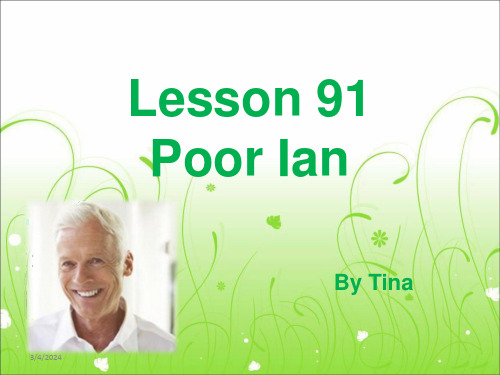
come to work→work等
• 现在完成时可表示持续到现在的动作或 状态,动词一般是延续性的,如
• live, teach, learn, work, study, know.
• 过去时常用的非持续性动词有: • come, go, leave, start, die, finish,
become, get married.
特疑词+ have (has)+主语+p.p?
(2) 表示动作发生在过去某个不确定的时间, 但对现在留下了某种影响和结果。 常被just、already、yet 等副词修饰。
-Have you had lunch yet? 你(已经)吃午饭了吗? -Yes, I have. I‘ve just had it. 我刚刚吃过。(现在我不饿了)
(强调动作,过程)
move out (of) 搬出来
move away
搬走
move from…to…
从…搬到…
②感动,打动
This story moved me. 这个故事感动了我。 The news moved him very much. 这消息使他很感动。
Байду номын сангаас
★ miss [mis] v. 想念,思念
★ person ['pə:sən] n. 人
He is a nice/good person. 他是个好人。 in person 亲自,直接的 He will go to get the money in person. 他将亲自去取钱。
★ personal adj. 个人的,私人的
['pə:sənəl]
• The patient is lying still. • 病人安静地躺着。
完整版新概念第一册Lesson91 92
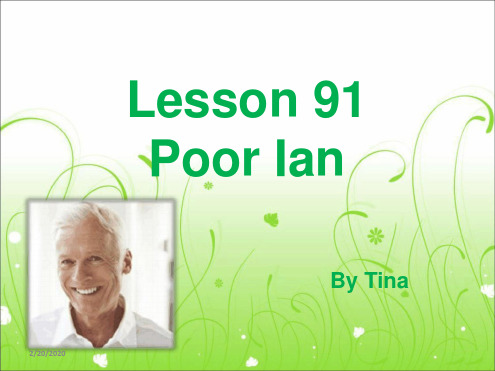
★ people [ 'pi:pl] n. 人们
①n. 人们
There are a lot of
people in the
street.
街上有很多人。
the people 民众,人民,国民
? ②贫穷的 ? 反义词:rich ? a poor man 贫穷的人 ? the poor 穷人 ? We should help the poor. ? 我们应该帮助穷人
? ③笨拙的,差劲的
? be poor at sth./ be poor at
doing sth.
不擅于…
? be good at sth./be good at doing
Lesson 91 Poor Ian
2/20/2020
By Tina
2/20/2020
2/20/2020
2/20/2020
New words and expressions
2/20/2020
? still [stil]
adv. 还,仍旧
? move [mu:v]
v. 搬家
? miss [mis]
? The patient is lying still. ? 病人安静地躺着。
★ move [mu:v] v. 搬家 ① v. 搬家;移动
They moved from Nanjing to Shenzhen. 他们从南京搬到深圳。来自move in搬进
(强调状态,结果)
move into 搬进来
特疑词+ have (has)+ 主语+p.p ?
2016新概念第一册-Lesson-91-92-课堂及课后练习
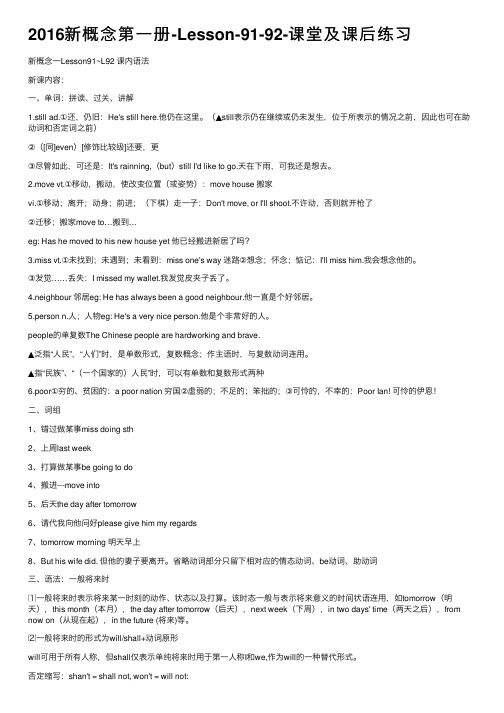
2016新概念第⼀册-Lesson-91-92-课堂及课后练习新概念⼀Lesson91~L92 课内语法新课内容:⼀、单词:拼读、过关、讲解1.still ad.①还,仍旧:He's still here.他仍在这⾥。
(▲still表⽰仍在继续或仍未发⽣,位于所表⽰的情况之前,因此也可在助动词和否定词之前)②([同]even)[修饰⽐较级]还要,更③尽管如此,可还是:It's rainning,(but)still I'd like to go.天在下⾬,可我还是想去。
2.move vt.①移动,搬动,使改变位置(或姿势):move house 搬家vi.①移动;离开;动⾝;前进;(下棋)⾛⼀⼦:Don't move, or I'll shoot.不许动,否则就开枪了②迁移;搬家move to…搬到…eg: Has he moved to his new house yet 他已经搬进新居了吗?3.miss vt.①未找到;未遇到;未看到:miss one's way 迷路②想念;怀念;惦记:I'll miss him.我会想念他的。
③发觉……丢失:I missed my wallet.我发觉⽪夹⼦丢了。
4.neighbour 邻居eg: He has always been a good neighbour.他⼀直是个好邻居。
5.person n.⼈;⼈物eg: He's a very nice person.他是个⾮常好的⼈。
people的单复数The Chinese people are hardworking and brave.▲泛指“⼈民”,“⼈们”时,是单数形式,复数概念;作主语时,与复数动词连⽤。
▲指“民族”、“(⼀个国家的)⼈民”时,可以有单数和复数形式两种6.poor①穷的、贫困的:a poor nation 穷国②虚弱的;不⾜的;笨拙的;③可怜的,不幸的:Poor Ian! 可怜的伊恩!⼆、词组1、错过做某事miss doing sth2、上周last week3、打算做某事be going to do4、搬进---move into5、后天the day after tomorrow6、请代我向他问好please give him my regards7、tomorrow morning 明天早上8、But his wife did. 但他的妻⼦要离开。
新概念一 lesson91-92 (完整版)
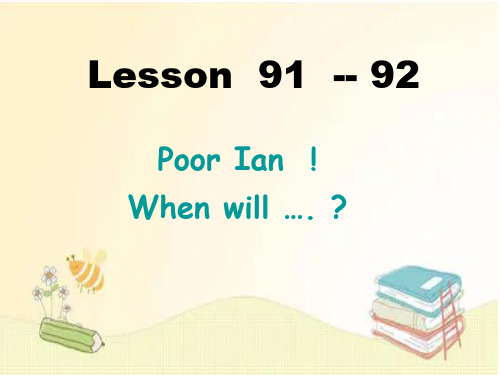
New words and expressions
• poor [ puE ]
adj.
3)笨拙的,差劲的
poor jokes 差劲的笑话
a poor excuse 笨拙的借口
New words and expressions
• poor [ puE ]
adj.
3)笨拙的,差劲的 sth
be poor at 不擅长….. doing sth eg: My daughter is poor at swimming.
( D)7.Mr smith _______________to Tokyo and he will be back in
a week • A. has been B. has visited C. has sent D. has gone
( B)8.They___________________ China for two years
Lesson 91 -- 92
Poor Ian ! When will …. ?
new words
• 1 believe [bi'li:v] v.相信,认为 • 7 because [bi'kɔz] conj.因为
• 2 may [mei] (用于请求许可)可以 • 8 retire [ri'taiə] v.退休
new words
New words
still [ stil ]
person [ `pE:sEn ]
adv.还,仍旧 move [mu:v ]
v.搬家 miss [ mis ]
n.人 people [ `pi:pEl]
n.人们
v.想念,思念
poor [ puE ]
Lesson91-92课件新概念英语第一册
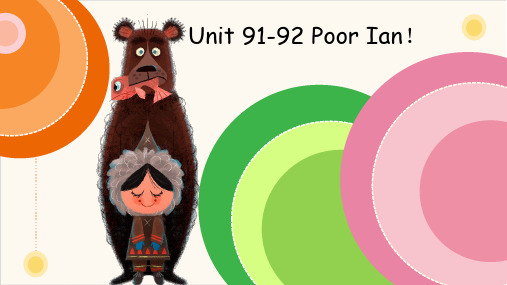
❌变否定
1.I will improve my writing skills. I won’t improve my writing skills.
2.He will go to the market tomorrow. He won’t go to the market tomorrow.
be going to
will do
be going to 使用的两种情况:
2.表示事先经过考虑, 安排好打算要做的事情。
如果出现计划、打算一般 都用be going to .
I am going to watch a film.
1.表示根据目前某种迹象 判断,某事非常有可能发生。
will 使用的三种情况:
It is Friday today.
It will be
Saturday tomorrow.
It will be rainy tomorrow.
adj.
She will be at home.
prep.
She will be 12 years old .
n.
be It will
rainy. 当句中没有实义动词时,我们需要在will 后加be动词,
1.表示单纯的 未来"将要", 通用各个人称.
They will go to visit the factory tomorrow.
2.表示不以人的 意志为转移的 自然发展的未 来的事。
He will be thirty years old this time next year.
3.问对方是否愿意 做某事或表示客气 地邀请或命令.
新概念英语第一册91-92课
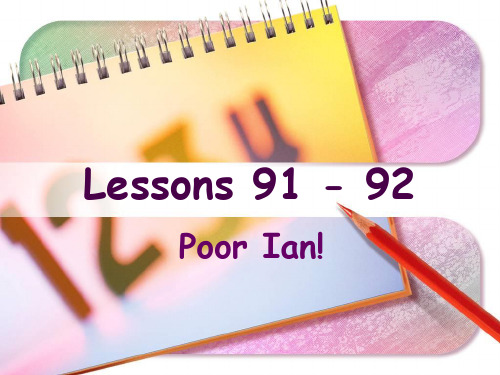
Poor Ian!
New words and expressions
still adv. move v. miss v. neighbour n. person n. people n. poor adj.
还,仍旧 搬家 想念,思念 邻居 人 人们 可怜的
引导宾语从句的关联词有从属连词,疑问代词, 疑问副词,缩合连接代词,缩合连接副词等。
Grammar--宾语从句
I am afraid that you can't see him today. 我恐怕你今天见不到他。 (关联词是从属连词that)
在非正式文体中关联词that常被省去。 eg:I hope you can come tomorrow. 我希望你明天能够来。 (that省略)
JENNY:
No, not yet. He's still here. He's
going to move tomorrow.
move to 搬家到... eg:All her family have moved to the US.
她全家人都已经搬到美国去住了。
完整的回答: He hasn't moved to his new house
1)一般将来时表示将来某一时刻的动作、状态以 及打算。该时态一般与表示将来意义的时间状语 连用。
tomorrow this month the day after tomorrow next week in two days' time from now on in the future
Grammar--宾语从句
用作宾语的从句叫做宾语从句,即充当宾语成份 的不是一个单词或词组,而是一个句子。
Lesson91-92(教案)-2023-2024学年新概念英语第一册
答案:Yes, I like traveling. Because it can broaden my horizons and enrich my life experience.
3.请用英语描述你最喜欢的季节,并说明原因。
答案:My favorite season is spring. Because it is warm and pleasant, and everything is full of vitality.
10.学习兴趣:学生通过学习英语,提高了学习兴趣和积极性,能够更加主动地投入到英语学习和实践中。
内容逻辑关系
①重点知识点:本节课的重点知识点包括英语日常表达和语法知识,如问候、介绍、询问等。
②词句:课程中将涉及一些基本的词汇和句型,如hello、how are you、my name is等。
③板书设计:
在教学方法上,我采用了讲授法、讨论法和案例研究法相结合的教学方法。通过这种方式,学生们能够更好地理解和掌握课程内容,同时也能够提高自己的思维能力和分析问题的能力。然而,在实际操作中,我发现学生们在小组讨论和合作学习上还存在一些问题。为了提高学生们的小组讨论和合作学习的效果,我需要在未来的课程中更加注重小组讨论和合作学习的指导和反馈。
5.教师评价:教师需要对学生的学习情况进行全面的评价,包括学生的学习态度、学习方法、学习效果等方面。教师需要给予学生积极的评价,鼓励学生继续努力,同时也需要指出学生的不足之处,帮助学生改进。
九、作业评价
1.认真批改:教师需要认真批改学生的作业,检查学生对课程内容的掌握程度。
2.点评:教师需要对学生的作业进行点评,给予学生积极的反馈。
(4)讨论:组织学生进行小组讨论,让他们就某个话题进行交流和分享,提高他们的思维能力和分析问题的能力。
新概念英语第一册第91-92课ppt课件
6
★neighbour
n. 邻居
neighbourhood
n.四邻,邻近地区
这一带很安静。
This is a quiet neighbourhood.
他要搬到这一带。
He is moving into the neighbourhood.
in the neighbourhood of
10
rain snow leave get up arrive finish work have a holiday drive home
have a haircut telephone me have a shave pack his bags sweep the floor paint this room repair my car
He’s still here.
将来时的时间状语
He’s going to move tomorrow.
be going to 打算做某事
25
将来时的时间状语
CATHERING: When? Tomorrow morning?
JENNY:
No. Tomorrow afternoon.
I'll miss him. 思念,想念 错过
make an appointment
11
02
Practice
12
• still • move • miss • neighbour • person • people • poor
v. 想念,思念 n. 邻居 adv. 还,仍旧 v. 搬家 n. 人 adj. 可怜的 n. 人们
13
03
Game Time
新概念第一册Lesson 91-92课件
still /stil/ adv.还,仍旧
eg.I still want that toy! 我还是很想要那个玩具。 She was still beautifull at the age of 50. 她50岁时依然美丽。
move /mu:v/ v. ① 搬家
move from...to...从...搬到... eg. They moved from Nanjing to Shenzhen. 他们从南京搬到了深圳。 We are going to move to a house in the country. 我们将要搬到乡下的房子里去。
miss /mis/ v. 想念,思念
1)想念,思念 eg. We will miss you if you move. 如果你搬家了,我们会想你的。 I really miss my hometown. 我真的很想念我的家乡。 2)错过 We missed the bus. 我们错过了那辆公车。
一般将来时
eg. He will not (won't) come back next week. 他下周回不来。 eg. She will not (won't) go to visit her friend this afternoon. 她今天下午不会去拜访她的朋友。
Grammar -
一般将来时
Lesson 91-92
11. Ask me what Ian has always been? What has Ian always been? 12. Ask me when the new people will move into this house? When will the new people move into this house? 13. Ask me if the new people will move in this afternoon? Will the new people move in this afternoon? 14. Ask me if Jenny will see Ian today? Will Jenny see Ian today? 15. Ask me what Linda wants Jenny to do? What does Linda want Jenny to do?
新概念英语NCE_Lesson91-92(共46页)课件
because 因为
• because of 由于、、、因为、、、 的缘故,与because 不同,后面不 跟从句。
➢ I want to be bed early because I was tired.
➢ I was late because of the rain.
★retire • ① v. 退休;离职 • 不久他将退休,结束其航海生涯。
Ian: Women always have the last word.
课文讲解
• I believe that this house is for sale. • for sale 供出售,有待出售。 • on sale 减价出售。
• May I have a look at it? • have a look at = look at 看一看 • 我想看一下那张地图。
• I want to have a look at that map. • 正式提出请求:May I...? • 我能进来吗?
• May I come in? • 较为随意的请求方法:Can I...? • Can I come in?
• -How long have you lived here?
• He’s going to retire soon from the sea. • ② v. 退出;退隐 • 他周末通常退隐到他那个乡间别墅生活
• He often retires to his country house at weekends.
• 女士们离席退出,先生们则继续喝酒聊天。
• The ladies retired, and the gentlemen went on drinking and chatting.
- 1、下载文档前请自行甄别文档内容的完整性,平台不提供额外的编辑、内容补充、找答案等附加服务。
- 2、"仅部分预览"的文档,不可在线预览部分如存在完整性等问题,可反馈申请退款(可完整预览的文档不适用该条件!)。
- 3、如文档侵犯您的权益,请联系客服反馈,我们会尽快为您处理(人工客服工作时间:9:00-18:30)。
翻译下列句子
• 请代我向你家人问好!Please give your family my regards • 他昨天没来,是吗?是的,他没来。/不,他来了的。He did not come here yesterday, did he? • No, he didn't/yes. He did. • 你明天做什么?What are you going to do tomorrow? • 我要去踢球。I am going to play football • 你去哪儿啊?Where are you going? • 我去看看我的老师。I am going to visit my teacher. • 我和Tom都会想念你的。Tom and I will miss you.
一般将来时
• • • • • • • What will… he'll / she'll / it'll/ he'll When will… What will you do tomorrow? When will you leave? 你后天打算去学校干嘛啊? 你什么时候出发? 注意在翻译时要与表示将来的时间状语连 用。
Lesson 91-Lesson 92
Poor Ian
• • • • • • •
still move miss neighbour person people poor
adv. 还,仍旧 v. 搬家 v. 想念,思念 n. 邻居 n. 人 n. 人们 adj. 可怜的
• • • • • • • • • • • •
shall,Will的用法
• 在表达将来要发生的事情时,通常要用到 shall和will, shall一般与第一人称连用,will 一般与第二和第三人称连用,但是现在已 经很少用到shall了,大家都被美语同化了, 不论人称都用will。 • I will go to school tomorrow. • My husband and I will both miss him. 当人数 超过一人时,will后面要加both, 表示都是。
• miss • ① v. 想念,惦念 • 我想你 • I missed you.
• I'll miss him. = I will miss him • I miss home very much. • I miss you because I missed you.
② v. 错过;未做到 • 他睡过了头,错过了他那班火车。 • He overslept and missed his train. • 我错过了一个可能实现自己梦想的机会。 • I missed an opportunity of realizing my dream.
• -He didn't want to leave this house. • -No, he didn't, but his wife did! • 第二个句子是对第一个句子的证实,这里 不可以按照中文习惯去赞同别人的说法, 而是要根据事实来说,因此回答no, he didn't want to leave. 但是翻译成中文的时候 要说,是的,他不愿意离开。 • eg: He didn't go to school last week, did he? • No, he didn't. 是的,他没去。 • Yes, he did. 不,他去了的。 • 注意没有混搭形式:Yes, he didn't. / No, he did.
still adv. 还,仍旧 ① adv. 还是,仍然 我仍然不知道他是什么意思。 I still don't understand what he meant. ② adv. 还要,甚至更 她上周看起来病得很严重,这周更严重了。 She looked very ill last week and this week looks still worse. ③ adv. 静止地;安静地 He is sitting still. 他一动不动地坐着。 病人安静地躺着。 The patient is lying still.
• He's going to move tomorrow. • be going to do 计划、打算做某事。
• He has always been a good neighbour. • 现在完成时 • 指Ian自从在这住开始到现在一直都很 好 • He's a very nice person. • 表达人的人品很好可以用good或nice。 • person 强调的个体的人,可以有复数 形式persons • people 通常是人的统称。
• Please give him my regards. • give sb. sth. = give sth. to sb. 给某人某 物=把某物给某人 • 请代我们问候你的父母 • Please give your parents our regards. • Please give our regards to your parents. • Poor Ian• •
课文讲解
-Has he moved to his new house yet? -No, not yet. Move to 搬到… 我明天要搬到B区的办公室。 I'll move to the office in zone B tomorrow. • Yet用于疑问句和否定句的句尾。 • No, he has not moved to his new house yet.
• When will the new people move into this house? • move to = move into 搬进 • people = neighbours • 她是这个职位的合适人选。 • She's the right person for this job. • 公园里有很多人。 • There're a lot of people in the park.
一般将来时
• 一般将来时表示将来某一时刻的动作或状 态,或将来某一段时间内经常的动作或状 态。常常和表示将来的时间状语连用。如: tomorrow(明天), next week(下周), from now on(从现在开始);in the future (将来)等。 一般将来时由助动词shall (第一人称),will(第二、三人称) 动词 原形构成。美国英语则不管什么人称,一 律用will。
• • • • • • • • •
move v. 搬家;感动 这个故事感动了我。 This story moves me. move to 搬到……地方 move in 搬进 move out 搬出来 move away 搬走 我们下个月将搬到乡下 We'll move to the country next month.
